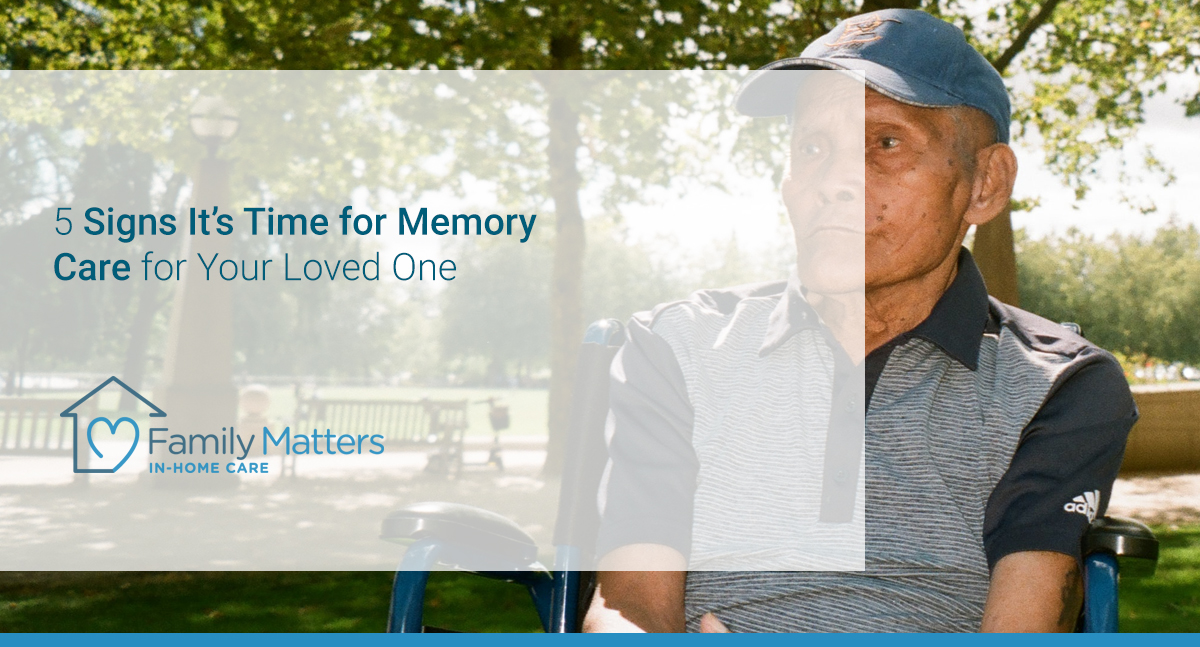
5 Signs It’s Time for Memory Care for Your Loved One
Witnessing a loved one’s struggles with Alzheimer’s or dementia symptoms can be difficult. As these conditions progress, you may notice certain tasks becoming increasingly challenging for them.
In-home memory care is one of the most beneficial things you can arrange for your loved one. However, you may be unsure of how to know when memory care is the right option for your loved one’s needs.
If you start to notice any of these five signs and symptoms, it is probably time to start considering getting in-home care for the person in your life with Alzheimer’s or dementia.
Their Social Life Is Declining
Isolation is a common problem for aging adults. Socialization is essential for humans to get their emotional needs met, so it is cause for concern when your loved one’s social life rapidly declines.
You may notice that they do not reach out to their friends anymore or no longer attend gatherings. Maybe your loved one mentions feeling lonely and “having no one” to talk to. These are major signs of social problems.
Alzheimer’s and dementia can both lead to social problems as these diseases progress. Unfortunately, changes in memory, mood, and behavior can be detrimental to even the strongest friendships.
If your loved one’s social life can no longer survive on its own, this is one of the signs it’s time for memory care. New caregivers can visit them in their home and bring new perspectives to their life.
They Neglect Their Health and Hygiene
You might start to notice that your loved one is not performing daily hygiene tasks as they should. This can include brushing their hair, showering, brushing their teeth, and doing their laundry.
You may see that their home has become unkempt or disorganized. This is especially concerning if your loved one has typically been neat and clean in the past.
In many cases, Alzheimer’s and dementia also interfere with a person’s ability to care for themselves. Your loved one may not remember to do these essential tasks. They may struggle with physical symptoms if they are not taking appropriate medications, like insulin or blood pressure pills.
If you notice that your loved one is neglecting their hygiene and their physical health is worsening, this is one of the signs it’s time for memory care from an in-home provider. Memory care often includes nursing services to help your loved one bathe, take their medications, and see a physician regularly.
They Cannot Make Bill Payments Regularly
We have all forgotten to pay a bill before, but when it becomes a regular occurrence, this is one of the key signs it’s time for memory care and living assistance.
You may hear that their utilities are being turned off, they are being charged late fees, or their providers are sending urgent letters asking for payments. If your loved one can no longer pay their bills or make other types of payments on time, memory care can help.
In-home memory care includes assistance with financial tasks like making payments and catching up on overdue bills. This way, you don’t have to worry about your loved one losing important services like water and electricity, or even their home.
They Keep Getting Lost and Confused
If your loved one often takes walks and ends up confused about their location, this is one of the early signs it’s time for memory care.
Memory problems often start with trouble navigating familiar neighborhoods and shops around your loved one’s home. They may not recognize their own home or their neighbors and start to feel distressed.
This can be dangerous for your loved one. If they get lost without a cell phone, they may not be able to tell someone how to guide them home.
Start thinking about finding an in-home memory care provider that can assist your loved one while they go on walks, go shopping, or visit other familiar places. This will give you peace of mind and ensure your loved one can still enjoy their favorite outings without getting lost.
You Are Burned Out
Caregiver burnout is real, and it can be dangerous. Family members who take care of loved ones with dementia or Alzheimer’s can suffer from mental health problems themselves.
Taking care of your loved one, no matter how much you love them, can become physically and emotionally exhausting over time. You might feel like you have no social life and no independence apart from caring for them. These are signs of burnout that need to be addressed.
In-home memory care gives long-term caregivers some relief from burnout. You can still visit your loved one, spend time with them, and help care for them, but you don’t have to do all of the work every day.
Your health matters as much as your loved one’s, and you cannot provide good care if you are not emotionally healthy.
If you are noticing any of these signs in your loved one, it may be time to consider in-home memory care. By allowing an in-home memory care provider to assist with your loved one’s care, both you and your loved one can experience an improved quality of life and greater peace of mind.
If you or your family member is considering in-home care as part of a plan to age in place, contact Family Matters In-Home Care today for a free consultation. Our team is dedicated to supporting your family and helping older adults enjoy life in the comfort of their own home for as long as possible.
Some of the services offered by Family Matter In-Home Care include: Alzheimer’s & Dementia Care, Bed & Wheelchair Transfer Assistance, Companionship, Housekeeping & Meal Preparation, Personal Care, Recovery Care, and Transportation.
Serving the San Francisco Bay Area and Greater San Diego, Family Matter In-Home Care has offices throughout California including: Campbell, CA, Roseville, CA, San Marcos, CA, and San Mateo, CA.
